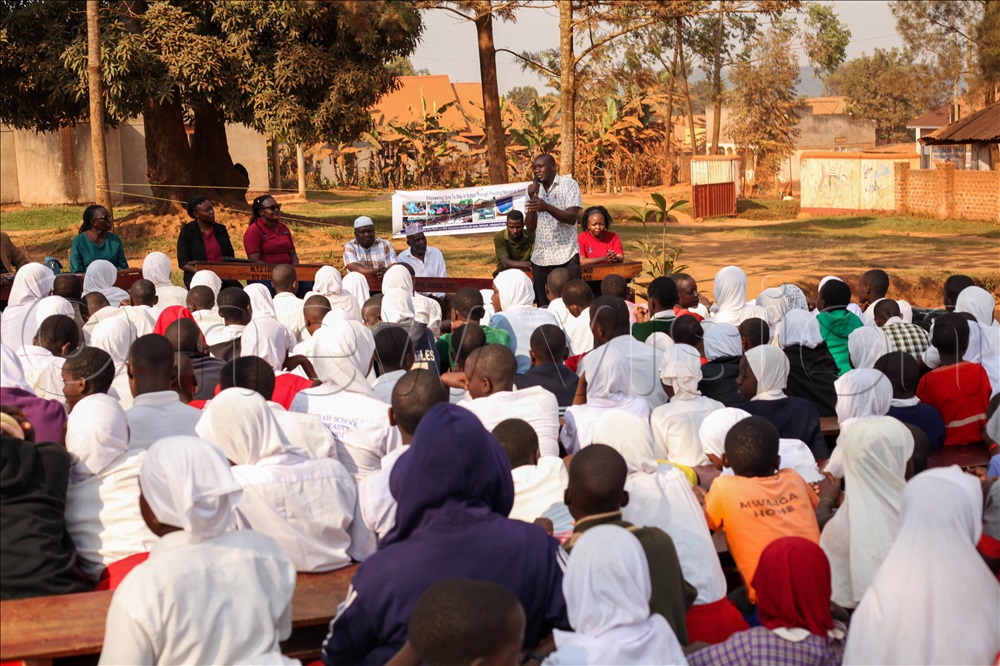Menstrual health project transforms five Wakiso govt schools
The project, officially launched on July 31 and August 1 2025, is not only constructing safe rooms and bathrooms but also rebuilding the confidence of schoolgirls, one pad at a time.
The leadership at DRI-Uganda, together with the Ministry of Education representative, the school Headteacher and pupils pose for a photo with a school tank at Namuserra UMEA primary school. (Photos by John Musenze)
________________
In Uganda’s overcrowded public primary schools, adolescent girls have silently battled with menstruation, an issue long neglected within the education system.
Without sanitary towels, clean water, or private spaces, many girls resort to staying home during their periods, missing up to five days of class each month. Others eventually drop out altogether. But for five government schools in Wakiso district, this reality is beginning to change.
Through a partnership between Development and Relief Initiative Uganda (DRI-Uganda) and Islamic Relief Nederland, a new menstrual hygiene and water, sanitation and hygiene (WASH) support project is restoring hope for over 1,500 girls.
The project, officially launched on July 31 and August 1 2025, is not only constructing safe rooms and bathrooms but also rebuilding the confidence of schoolgirls, one pad at a time.
Dr Denis Baka Asiimwe, the country director of DRI-Uganda, said the sh414.5 million (€100,000) initiative was informed by research that showed most girls in UPE schools lacked the basic means to manage their menstruation.
“Many of these girls come from homes where parents cannot afford to buy sanitary towels. Most schools lack water and private safe rooms. As a result, girls stay home during their periods or drop out entirely. This project is our way of responding to that urgent need,” Dr Asiimwe said.
“These are bright girls who simply need dignity and support. They want to learn, but they are being failed by the system,” Asiimwe said at the commissioning event.

The Headteacher of Namusera UMEA Primary School, Jamir Kiwalabye, addressing some of the girls before the launch of the program.
The five schools — Namusera UMEA P/S, Kavumba COU P/S, St Kizito Namusera P/S, Kisimbiri COU P/S and Nansana COU P/S — now have underground wells, piped water, refurbished rainwater systems, and girl-friendly washrooms.
Four safe rooms have been stocked with reusable pads, painkillers, and warm water bottles. Perhaps more importantly, 31 peer educators have been trained to offer menstrual hygiene support, mentor their peers, and break taboos.
Samalie Nanvunanwa, who represented the Wakiso district education officer, praised the programme for restoring dignity to girls and giving them the comfort to learn.
“We always talk about school attendance and academic performance, but we forget what girls are enduring. This project speaks to their deepest need — dignity. It allows them to be girls and learners at the same time,” she said.
Menstruation remains a silent crisis in Uganda’s schools. A 2023 Value for Money Audit revealed that 64% of girls miss school regularly because they lack sanitary materials and access to clean toilets or water.
These figures echo findings by UNICEF and the Ministry of Education, which show a direct link between poor menstrual support and high dropout rates.
For headteachers like Jamir Kiwalabye of Namusera UMEA Primary School, the project has brought visible change.
“Our girls are now attending school even during their periods. They no longer hide or stay away. The stigma is slowly fading,” he noted.
The inclusion of boys in menstrual health training is also breaking new ground. By teaching boys to support, not shame, the girls around them, schools are cultivating more compassionate and respectful learning environments.
Uganda continues to push towards gender equality in education, and menstrual health can no longer be overlooked.
The Wakiso project is a powerful reminder that simple, targeted interventions — clean water, reusable pads, a private space — can make the difference between staying in school and dropping out.
“This is not just a health issue. It’s a human rights issue,” Asiimwe emphasised.
“Every girl deserves a safe space to manage her period and pursue her education without fear or shame, and be able to not miss over 15 days in a term just because of the healthy days.”